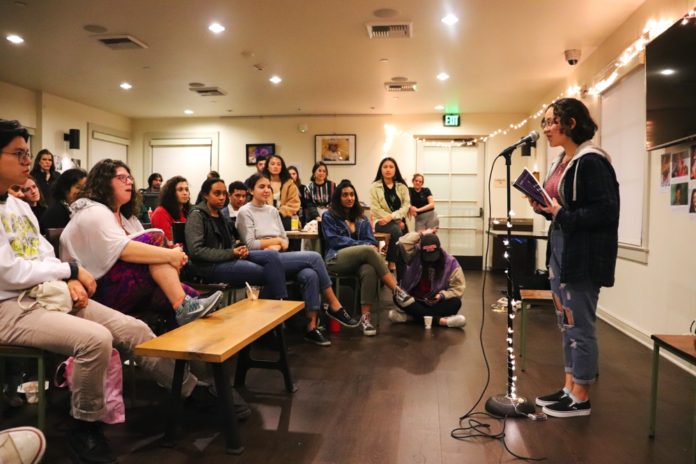
Student Leadership, Involvement and Community Engagement (SLICE) partnered with the International Programs Organization (IPO) and Latinx Student Union (LSU) to celebrate women of color in their event “Open Mic: A Celebration of Womxn of Color” in the Green Bean March 8. Brenda Jackson (sophomore), who works at SLICE and is part of the LSU executive board, was in charge of organizing and facilitating the event in honor of International Women’s Day. Jackson said the purpose of the project was to amplify the voices of women of color at a predominately white institution.
There were five performances during the open mic, including monologues, poetry and musical performances. Sandy Nyugễn (sophomore) performed “Lonely and Holy” by Jamila Woods, a Chicago-based musician, and was accompanied by Naia Mitchell (senior). Nyugễn said they chose these songs because they wanted to represent their hometown of Chicago and introduce the audience to music they had been recently listening to. According to Nyugễn, the event was impactful because of its intent.
“I loved seeing people of color being able to access their creativity,” Nyugễn said.
According to Jackson, although the event was shorter than expected due to a lack of people who initially signed up, many of the performers described how they enjoyed the event. Estephany Lopez (junior) said she resonated with the powerful performances of the women, specifically Jessica Rodriguez’s (sophomore) performance. Lopez originally came to the event to support her friends and eventually decided to share an original poem she had written.
“Everything that everyone did resonated with me because we all have very different experiences, but there’s always something that ties them together,” Lopez said.
According to Jackson, there is a lack of space on campus for the voices of women of color. She said there needs to be more spaces for women of color to express themselves, especially through art. As a performing artist and music major, Jackson spoke about the prominence of whiteness in the arts because of privilege and access, which creates a discrepancy between who gets to enjoy and profit off the arts and who does not. As a result, many women of color working in the arts struggle to have their voices heard, according to Jackson.
“I do think it’s important to call people in to listen to women of color, so they can be appreciated as much as white women are by society,” Jackson said.
Jackson said she wanted to pay homage to women of color outside of Occidental’s campus who have contributed to the fight for equity. Victoria Santa Cruz was an Afro-Latina activist and poet from Peru who wrote the famous poem “Me Gritaron Negra.” Miriam Makeba was an anti-apartheid activist and musician from South Africa that ushered Zulu influences into mainstream music. Jackson put up pictures and descriptions of these women on the wall behind the stage.
Jackson said it is important to be an effective ally to women of color and described how someone can be an ally. According to Jackson, giving power to women of color by making choices and resources available is important. She said many women of color, like herself, are often self-sufficient, and people can be better allies by offering their help and support.
“For me, women of color and people of color, in general, are raised to be more self-sufficient. You’re not raised to ask for as much help — at least that’s how I think Latinx culture is usually. You do things on your own and that’s how it is,” Jackson said. “You often take on too many responsibilities but you feel like you have to get it done because that’s how you have been raised. A way to be a good ally is to offer your help without putting pressure on women of color to accept your help.”
On allyship, Lopez brought up the discussion of the presence of white people in supporting women of color by listening to them and showing up for them, but not speaking over them.
“The first thing I can think of is POC Formal — how they don’t really show up to our programming events but wanna go out and have fun with us,” Lopez said. “I think being very intentional about the space you’re taking up, and not when it’s convenient, and being selective.”
![]()






























